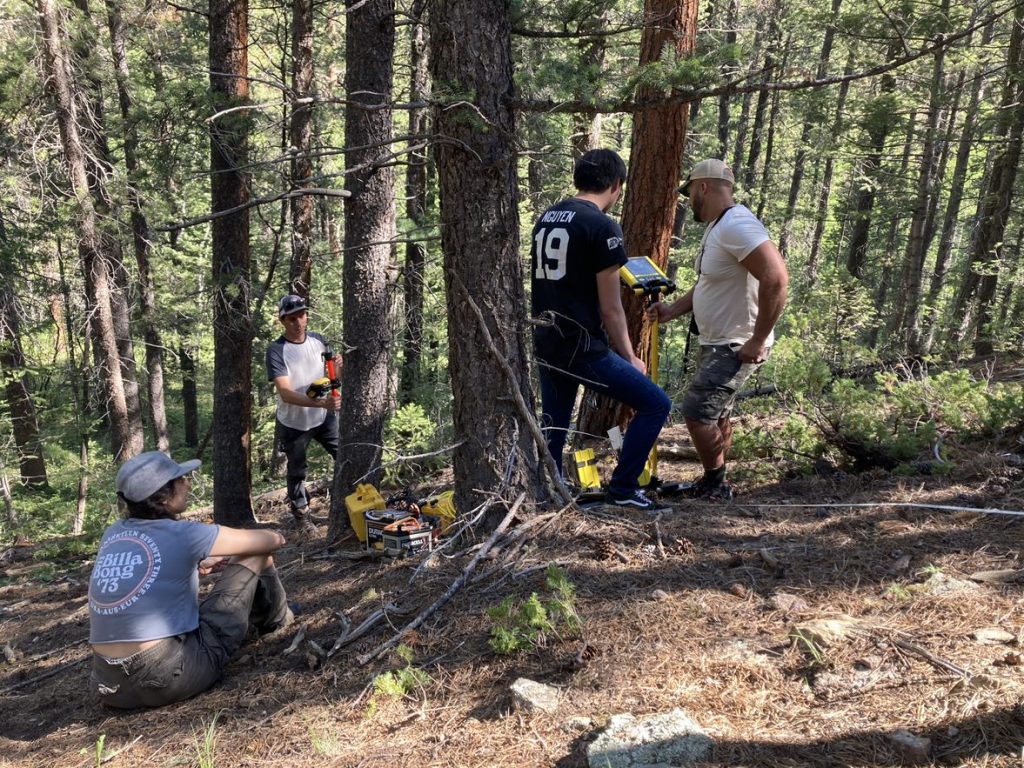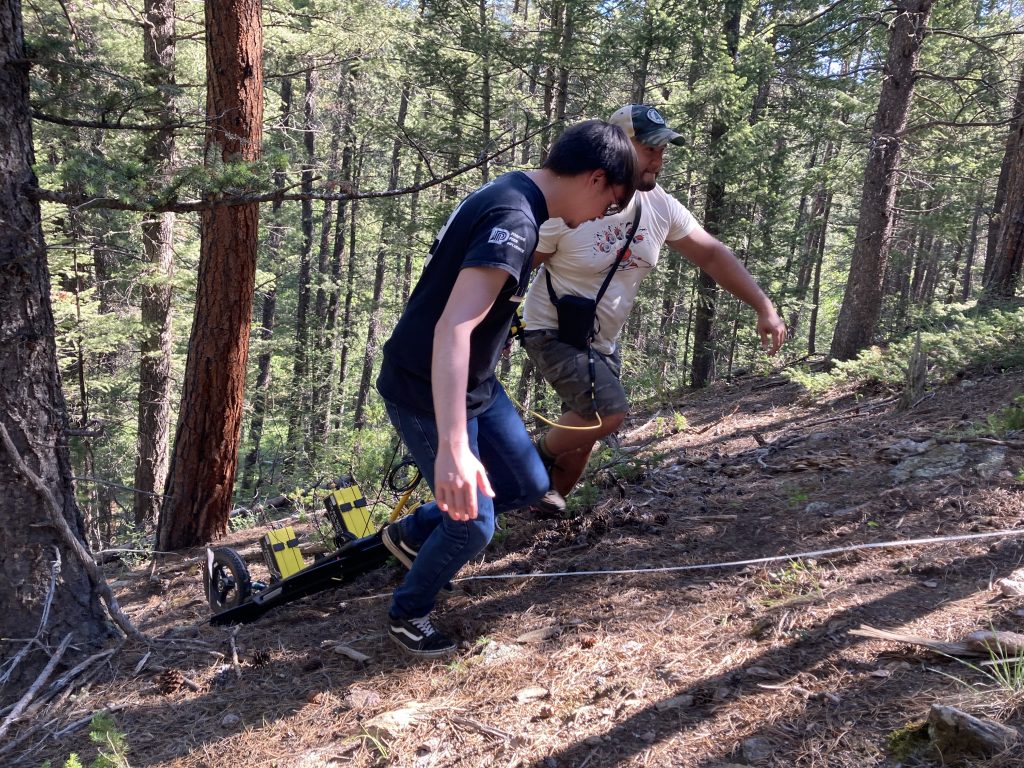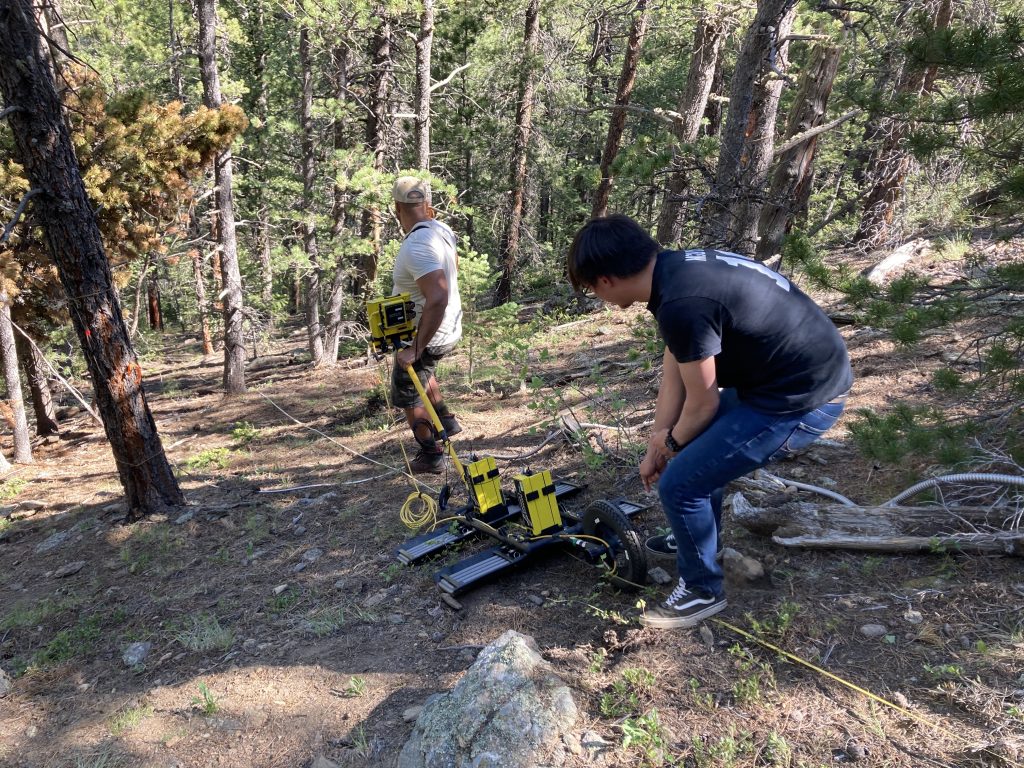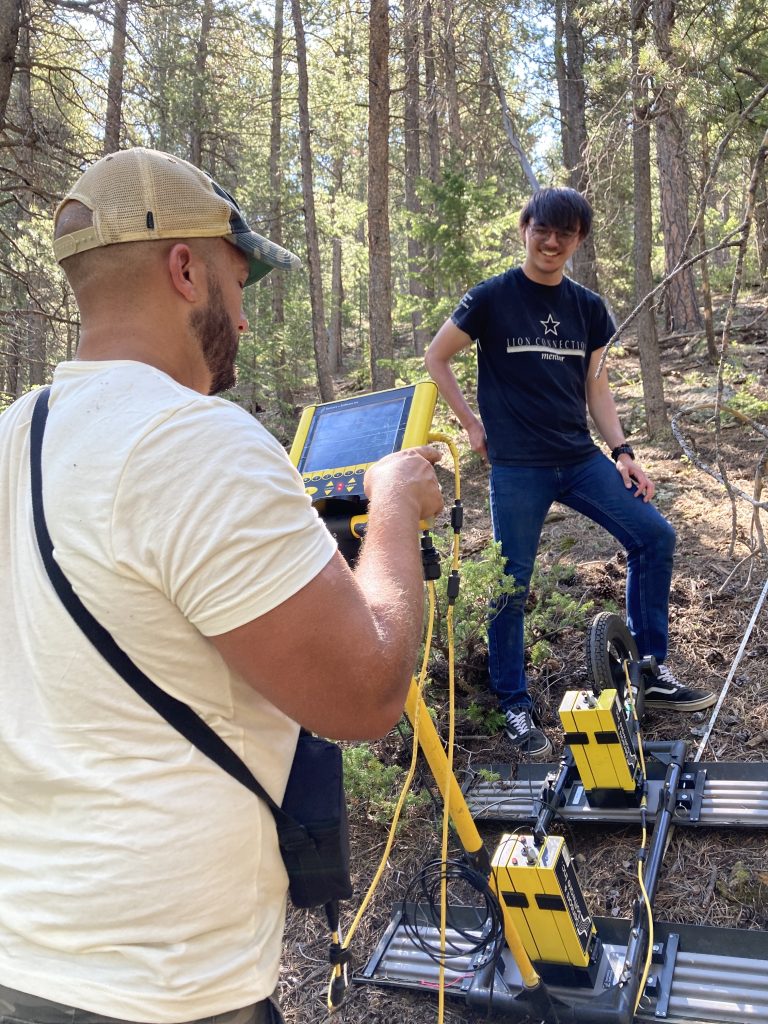
Alex Nguyen helping pull a GPR instrument up a hill for Dr. Singha’s lab group. (Photo/Dr. Kamini Singha) 
2021 RESESS Intern Alex Nguyen. 
Alex helping pull a GPR instrument up a hill for Dr. Kamini Singha’s lab group. (Photo/Dr. Kamini Singha) 
Alex helping pull a ground penetrating radar (GPR) instrument up a hill for Dr. Kamini Singha’s lab group. (Photo/Dr. Kamini Singha) 
Alex Nguyen takes a break from pulling the GPR instrument as another lab member looks at the instrument. (Photo/Dr. Kamini Singha)
This summer we’re introducing interns in the RESESS and Geo-Launchpad programs to shine a spotlight on the research projects they are completing throughout these 11-week internships and on their interests in geoscience.
Alex Nguyen is a rising junior at Vassar College studying Earth Science and Astronomy. In high school, Alex participated in a program at Washington University in St. Louis through which he took an introductory course in global climate change. This experience sparked Alex’s interest in renewable energy and large-scale climate impacts, leading him to study geology in college. At Vassar College, Alex has been working with a visiting professor who is using thermodynamic models of the magma chambers underneath two volcanoes in Nicaragua through analyses of volcanic glass, pumice, and scoria samples.
Alex was motivated to find a summer internship that included field work so that he could have a better sense of his research interests for graduate school. Although he was excited by the opportunity to gain research and field work experience, Alex was particularly interested in the RESESS program because it prioritizes supporting college students who are first-generation, low-income, and underrepresented minorities. Additionally, he was drawn to the mentorship aspect of the program, hoping for guidance in applying to graduate school and writing scientific papers.
Dr. Holly Barnard, hydrologist and geographer at University of Colorado Boulder, is mentoring Alex this summer. For the first component of his research, Alex helped Dr. Barnard’s graduate student, Ethan Burns, install sap flow sensors in Gordon Gulch for his dissertation. Sap flow is defined as the movement of sap—water with nutrients and hormones—through plants. Sap flow is measured in the xylem of plants, specifically, the sapwood portion. It is noteworthy that this sap is distinct from sugary sap that is present in the phloem of plants. Because sap flow is the movement of liquid through plants and transpiration is the loss of water from the plant, sap flow tracks transpiration. Alex aided in wiring the sensors and plotting the locations of trees.
As he is currently working remotely, Alex is analyzing surface seismic refraction data from 2014 in order to qualitatively assess groundwater flow in the subsurface. Combined with soil moisture and transpiration rates, Alex is able to use the information about the subsurface to determine the water storage in a region. By comparing water storage estimates with data from the sap flow sensors, additional information about the subsurface can be obtained, like if there is fractured, weathered rock in the subsurface.
One of the primary findings of Alex’s study will be the rock moisture of the Gordon Gulch environment, which is the water that is stored below soil moisture in fractured bedrock. Because Gordon Gulch is semi-arid with a limited amount of water that mostly comes from snowpack in the winter, the environment is stressed and the trees intensely rely on this constrained water supply. Alex’s research will help understand how transpiration rates are impacted by rock moisture, and can be applied to similar environments.
Q&A
- What has been your favorite part of the RESESS program so far?
I’ve really enjoyed being able to get field work experience. I haven’t been able to do any field work at my college [with] my second year being constrained with COVID. Being able to get that field work experience is really eye-opening and really enjoyable because I know in going to graduate school, I want to have some sort of field work component. Also, just being part of a cohort of everyone through the UNAVCO internship program is really nice, which I probably wouldn’t have gotten going to some other programs.
- What have you gained from your mentorship with Dr. Barnard?
Through Dr. Barnard and her graduate student, Ethan Burns, I’ve gained a lot of knowledge and advice, as well as just general experience and experience doing field work—how complicated things can be with making sure your equipment works and all the problems that can happen out in the field, as well as just general advice about applying to graduate school and pursuing higher education. It’s all been really helpful. I’m glad I was able to be in-person and have that experience with them.
- Have you learned about any new topics or research techniques that have really piqued your interest?
Before this project, I was extremely unfamiliar with hydrology, as well as ecohydrology—it’s not really in my realm of experience or background at all. It was interesting to be able to tag along on this project and be thrown into it, going straight into the field work the first week, and just seeing all of the passion that Holly and her grad student have with doing their work. I think, apart from doing more field work, this project has made me want to consider more hydrological aspects of future research and maybe doing planetary surface stuff. Water is pretty interesting and seeing how it moves through ecosystems and environments is pretty fascinating, too.
After completing the last two years of his undergraduate degree, Alex hopes to obtain a PhD in planetary science or planetary geology. He would like to pursue planetary research at an organization like NASA or JPL and contribute to the effort for space exploration. As for this summer, Alex is hoping to earn a motorcycle permit and visit his sister in San Francisco.


